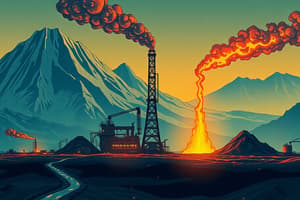Podcast
Questions and Answers
What is the first stage in the formation of coal?
What is the first stage in the formation of coal?
- Coke
- Coal tar
- Coal gas
- Peat (correct)
Which process transforms dead vegetation into coal under high pressure and temperature?
Which process transforms dead vegetation into coal under high pressure and temperature?
- Decomposition
- Destructive distillation
- Carbonisation (correct)
- Fermentation
Which of the following is NOT a by-product of the destructive distillation of coal?
Which of the following is NOT a by-product of the destructive distillation of coal?
- Coke
- Ammonia
- Coal tar
- Peat (correct)
Fossil fuels are derived from the decomposition of which of the following?
Fossil fuels are derived from the decomposition of which of the following?
What is the black-colored fossil fuel that is extracted from the ground called?
What is the black-colored fossil fuel that is extracted from the ground called?
Which of the following types of energy is primarily utilized from fossil fuels?
Which of the following types of energy is primarily utilized from fossil fuels?
What is coal gas derived from during the destructive distillation of coal?
What is coal gas derived from during the destructive distillation of coal?
Natural resources can be classified into two main types, one of which is:
Natural resources can be classified into two main types, one of which is:
What is coal tar primarily used for?
What is coal tar primarily used for?
What is the correct definition of coke produced from the destructive distillation of coal?
What is the correct definition of coke produced from the destructive distillation of coal?
Which of the following processes is NOT part of the secondary recovery of oil?
Which of the following processes is NOT part of the secondary recovery of oil?
What is the purpose of fractional distillation in oil refining?
What is the purpose of fractional distillation in oil refining?
Which characteristic describes natural gas?
Which characteristic describes natural gas?
What process is used to produce ammonia liquor during the destructive distillation of coal?
What process is used to produce ammonia liquor during the destructive distillation of coal?
Which of the following represents a common use of the products obtained from fractional distillation?
Which of the following represents a common use of the products obtained from fractional distillation?
What is CNG and how is it related to natural gas?
What is CNG and how is it related to natural gas?
Study Notes
Introduction to Coal and Petroleum
- Energy can be extracted and transformed from natural resources as heat or work.
Types of Energy
- Various energy forms exist, each with distinct properties and applications.
Natural Resources
- Derived from the Earth, natural resources are classified as renewable and non-renewable.
Fossil Fuels
- Formed from the decomposition of organic matter, fossil fuels include coal and natural gas.
- Energy in fossil fuels comes from decayed plants and animals over millions of years.
Coal Formation
- Coal is a black fossil fuel used for various purposes.
- Peat, the early stage of coal, consists of partly decomposed plant matter.
- Carbonisation is the process that transforms vegetation into coal under high pressure and temperature.
Types of Coal
- Four main varieties of coal exist, differentiated by carbon content and uses.
Destructive Distillation of Coal
- This process involves heating coal without air, producing by-products:
- Coke: Pure carbon, utilized in steel manufacturing and metal extraction.
- Coal Tar: Thick liquid used in manufacturing multiple substances.
- Coal Gas: A fuel derived from coal distillation, used in various industries.
- Ammonia Liquor: A by-product used in fertilizer production.
Oil Extraction and Reservoirs
- Oil extraction involves obtaining usable oil from the Earth’s surface.
- Oil reservoirs have specific characteristics that influence extraction methods.
Oil Production Process
- Primary Production: Natural oil flow that may last days to years.
- Secondary Recovery: Enhanced extraction methods to obtain more oil.
Crude Oil
- An unrefined petroleum product consisting of hydrocarbons.
Oil Refining
- Fractional distillation separates crude oil into components based on boiling points.
Uses of Distillation Products
- Various products obtained from crude oil are essential in everyday applications.
Petroleum Shortage & Conservation
- Addressing petroleum shortages requires effective conservation strategies.
Natural Gas
- A colorless, odourless fossil fuel, moved through pipes for distribution.
- Compressed Natural Gas (CNG): Stored under high pressure, offering several advantages.
Occurrences of Natural Gas in India
- Found in Tripura, Rajasthan, Maharashtra, Tamil Nadu, and Andhra Pradesh, highlighting regional resources.
Studying That Suits You
Use AI to generate personalized quizzes and flashcards to suit your learning preferences.
Description
This quiz explores the elements of coal and petroleum as part of the CBSE 2023-24 syllabus. Learn about different energy forms, their conversion, and their applications in this foundational chapter. Test your understanding of natural resources and energy types through various questions.




